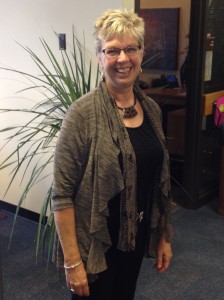Editor’s Note: This is the fourth in a series of occasional articles about the activities that will take place inside the Lane Center for Academic Health Sciences. The Lane Center is scheduled to open in Jan. 2014 on North Nevada Avenue
Mary Ann Kluge does not like the word clinic.
For Kluge, associate professor, Beth-El College of Nursing and Health Sciences, the term clinic is a relic of a medical model that emphasizes treatment of disease rather than promoting wellness, active living and integrated health services delivery. These are the cornerstones of the Lane Center for Academic Health Sciences.
At the Lane Center, Kluge will direct the Center for Active Living, an enterprise that will focus on helping people to continue physical activity as a way of preventing disease, continuing activities that they enjoy for as long as possible, and possibly learning something new.
“The definition for active living is really important,” Kluge said. “It is defined as a way of life in which physical activity is valued and integrated into daily life.”
The center will specialize in helping people identify physical activity that has meaning and value to them and how to participate in a safe environment. The center’s staff will work to support individual goals, needs, and interests, helping people adapt to changes that occur either as an effect of aging, injury or from medication.
“We are not thinking about running a health club,” Kluge said of the center. “It’s a health hub.”
Kluge’s goal is to make exercise fun, what she refers to as “a get to” rather than a “have to.”
“Sometimes I think of this as a reintroduction to what we all had naturally years ago,” Kluge said. “Movement was intrinsically joyful to us as children. So, in some cases, how can we reconnect to what we were naturally drawn to? Or, the reality is that a lot of people meet up with a recommendation for physical activity or exercise based on an event. It could be a heart attack, it could be a knee replacement — it could be something that they didn’t sign up for or didn’t expect.”
Kluge practices what she preaches, bringing lacrosse sticks to work and asking students to play catch on the University Hall lawn. She also formed a Saturday morning volleyball league for women over 50 at the Campus Recreation Center. She sees value beyond winning points as her peers hustle to reach a ball and in the intergenerational exchange when a lonely freshman joined the group.
Kluge comes from a coaching and athletic background with experiences that span the life course. She worked with developmentally delayed children, high performing college athletes, and senior citizens. She was part of the UCCS collaboration with Palisades at Broadmoor Park, a unique partnership with a senior residential care facility. There, she learned the value of health care professionals working together in a team-based environment.
As an example of cooperation among health professionals that includes exercise, Kluge cites treatment for high blood pressure. A common side effect of hypertension drugs is dizziness. With dizziness, falls can occur. Falls in seniors can lead to broken bones, the loss of independent living, or worse.
By working together in what she calls “friendly handoffs,” Kluge believes problems can be avoided. A client who receives hypertension medication in a clinical setting might also receive guidance from the Center for Active Living that includes exercises to improve balance and strengthen bones. A fall might either be prevented or its effects mitigated, she said.
“We all fall,” Kluge said. “But a fall doesn’t have to result in a broken bone or a break in confidence that suggests we are over-the-hill.”
Kluge hopes to prove the value of exercise, helping other health care professionals – and even insurance companies – to recognize the importance of physical activity as an integral part of overall health. But changing attitudes about exercise begins with individuals.
“My message has to be to the women: What do you pay to get your hair done? What do you pay to get your nails done? You’re willing to pay $75 for a manicure and pedicure. You’re willing to pay $75 to get your hair done. But you’re not willing to pay even a third of that or half of that to enhance your health? To men, I would say what has meaning and value in your life? What are other people expecting of you? Why do you need to be in this world as a breadwinner or as a guiding sage? Why is this important beyond you? What will you invest in this?”
“I want to help people make that shift from the investments that they make to the outside – to their appearance — to the inside at the Center for Active Living.”
Related articles:


Leave a Reply